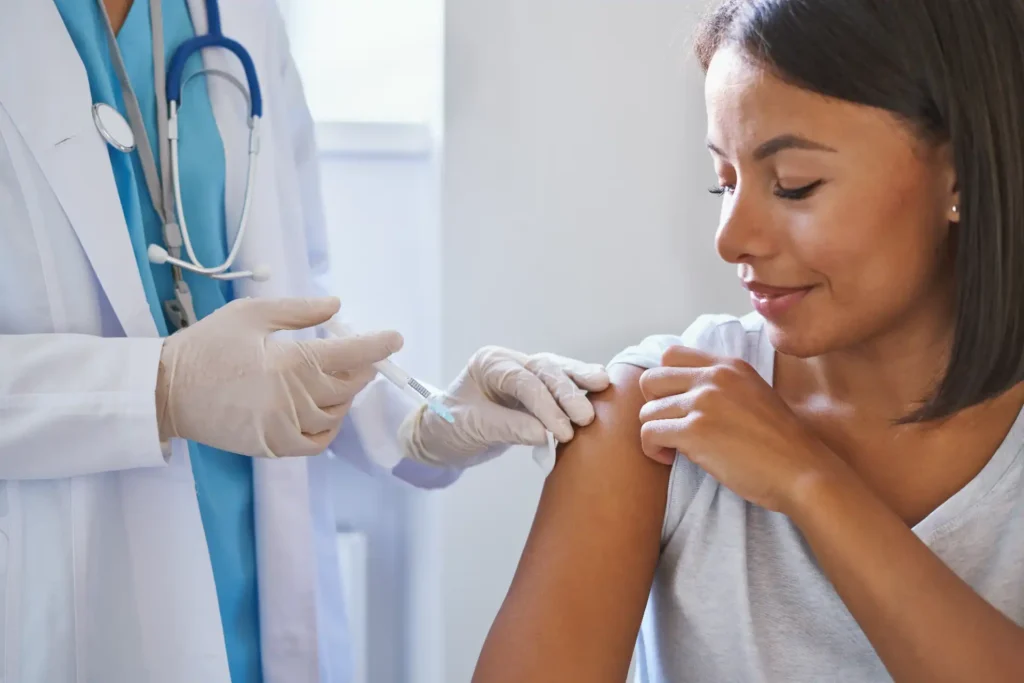Getting the right vaccines during pregnancy protects two people at once—you and your newborn. In 2025, four immunizations are top of mind for most expectant parents:
- Influenza (flu)
- Tdap (tetanus, diphtheria, pertussis—whooping cough)
- COVID-19
- RSV maternal vaccine (to protect your infant from RSV in the first months of life)
Below you’ll find the timing, benefits, common side effects, and practical tips for each—plus FAQs to help you decide what’s right for your pregnancy.
Why Vaccinate During Pregnancy?

Vaccination in pregnancy does two things: helps prevent severe illness in the mother (pregnant people are at higher risk for complications from infections like flu), and provides passive antibody transfer through the placenta so your baby is protected in the early months before they can be vaccinated themselves. That’s why timing matters: we want your body to make antibodies and pass them to baby before birth.
Flu (Influenza) Vaccine
What’s recommended in 2025
The flu vaccine is recommended in any trimester. In general, September and October are good months to get vaccinated, though third-trimester vaccination in July or August can be considered to maximize protection for newborns if flu vaccine is available and you’ll deliver during the season [CDC] [CDC ACIP].
Why it matters
- Pregnancy increases the risk of serious flu complications (pneumonia, hospitalization).
- Antibodies you make after the shot help protect your newborn during the first months of life.
Type of vaccine
- Get the inactivated flu vaccine (the shot). The nasal spray (live vaccine) is not used in pregnancy.
Common side effects
- Sore arm, mild fatigue, low-grade fever, headache—usually brief.
Tdap (Tetanus, Diphtheria & Pertussis)
What’s recommended in 2025
Tdap once each pregnancy, ideally between 27 and 36 weeks—as early in that window as possible to maximize antibody transfer to your baby [ACOG FAQ] [ACOG Provider FAQ].
Why it matters
- Whooping cough (pertussis) can be life-threatening for newborns. Maternal Tdap protects babies before they can start their own DTaP series.
If you had Tdap before
- You still need Tdap every pregnancy. Protection wanes and each baby needs fresh antibody transfer.
Common side effects
- Soreness/redness at the injection site, tiredness, mild fever for a day or two.
COVID-19 Vaccine
What’s recommended in 2025
CDC guidance indicates that people who are pregnant should receive the current season’s updated COVID-19 vaccine (2024–2025 formulation and then the 2025–2026 when available), because pregnancy raises the risk of severe illness [CDC: Pregnancy & COVID-19 Vaccines] and CDC’s “Stay Up to Date” page includes most adults, which encompasses pregnant people, for the updated vaccine [CDC Up-to-date]. If you’re unsure about timing or prior doses, your clinician can tailor a schedule.
Why it matters
- Pregnancy is a risk factor for severe COVID-19. Vaccination reduces hospitalization, ICU admission, and adverse pregnancy outcomes linked with severe infection.
- Antibodies cross the placenta and may offer newborn protection in early life.
Common side effects
- Arm soreness, fatigue, headache, muscle aches; fever is less common—ask your clinician about acetaminophen if needed.
Note: Public-health recommendations evolve. If you read conflicting headlines, use the CDC pages above or your obstetric provider as your source of truth. If access requires a provider discussion in your area, your OB-GYN or midwife can facilitate.
RSV Maternal Vaccine (Abrysvo)
What’s recommended in 2025
The maternal RSV vaccine (Pfizer’s Abrysvo) is recommended once during weeks 32–36 of pregnancy, usually given September–January in most of the continental U.S. to align with RSV seasonality [CDC: RSV for Pregnant People] [CDC: Protect Infants] [FDA PI] [FDA Abrysvo]. In regions with different RSV timing (e.g., parts of Alaska, Florida, some territories), local health guidance may adjust the window.
Why it matters
- RSV is a leading cause of infant hospitalizations each fall/winter. Maternal vaccination helps protect babies from birth through 6 months.
RSV vaccine vs monoclonal antibody
- To protect infants, CDC recommends either maternal vaccination or infant immunization with a long-acting monoclonal antibody (e.g., nirsevimab) in most cases. Most infants do not need both [CDC] [CDC Clinical Guidance].
Common side effects
- Injection-site pain, headache, fatigue. Your clinician will review rare risks and whether you’re a good candidate in your specific season and gestational timing.
At-a-Glance Timing Table
| Vaccine | Recommended Timing in Pregnancy | Main Goal |
|---|---|---|
| Flu (inactivated) | Any trimester; typically Sept–Oct (3rd-trimester July/Aug if appropriate) | Protect mom & newborn during flu season |
| Tdap | 27–36 weeks (as early in that window as possible) | Protect newborn from pertussis |
| COVID-19 (updated) | Throughout pregnancy (per current “up-to-date” guidance) | Prevent severe maternal illness; neonatal antibodies |
| RSV (Abrysvo) | 32–36 weeks, typically Sept–Jan (seasonal) | Protect infant from RSV in first 6 months |
Safety: What We Know
- Flu & Tdap: Long track records in pregnancy. Recommended for many years by CDC/ACOG with strong safety data [ACOG] [CDC].
- COVID-19: CDC states vaccination in pregnancy is safe and effective, with no evidence of fertility problems; benefits outweigh known risks from infection [CDC].
- RSV (Abrysvo): FDA-approved for 32–36 weeks’ gestation to prevent severe RSV disease in infants; CDC recommends seasonal maternal dosing or infant monoclonal antibody—not usually both [FDA PI] [CDC].
If you have a history of severe allergies, prior vaccine reactions, or preterm-labor risk factors, your clinician may individualize the plan. In some areas, access to certain vaccines may be coordinated through your OB-GYN or a pharmacy with provider collaboration.
Combining and Spacing Shots
- It’s generally fine to receive more than one vaccine on the same day at different sites (e.g., one in each arm). If you prefer spacing, your provider can sequence them based on your due date and local RSV/flu timing.
- Because TdAP and RSV both fall late in pregnancy, your care team will prioritize timing to optimize antibody transfer (Tdap 27–36 weeks, RSV 32–36 weeks in season).
What If I’ll Deliver Off-Season?
If you’ll deliver outside the typical RSV season (e.g., spring/summer in most of the U.S.) or live in a region with different RSV timing, your clinician may recommend skipping the maternal RSV shot and using infant monoclonal antibody after birth when the season begins. Local public-health guidance applies [CDC].
FAQs
Can I get vaccinated while breastfeeding?
Yes for flu, Tdap (if due for a booster outside pregnancy), and COVID-19 per CDC/ACOG. The maternal RSV vaccine is for pregnancy only; after delivery, infant protection is via monoclonal antibody if eligible. Discuss specifics with your pediatrician and OB-GYN.
What if I had COVID-19 already?
You can still get vaccinated. Prior infection provides some immunity, but vaccination broadens and prolongs protection. Your provider can advise on intervals after infection.
What about side effects and fever?
Mild side effects are common and short-lived. If you develop fever, ask your provider about acetaminophen and hydration strategies.
Can I get Tdap earlier than 27 weeks?
ACOG notes the preferred window is 27–36 weeks, but Tdap may be given earlier if needed (e.g., wound management, pertussis exposure). You’ll still likely receive it again in the preferred window for maximal newborn protection [ACOG].
Do I need RSV and the infant shot?

In most cases, no—choose one strategy with your clinician. Maternal RSV vaccine late in pregnancy or infant monoclonal antibody after birth both aim to prevent severe RSV; most infants don’t need both [CDC].
How to Plan Your Vaccine Calendar
- Confirm your due date and trimester.
- Map the season in your region (flu and RSV). Your provider/pharmacist can advise on local timing.
- Book appointments aligned to:
- Flu: any trimester (ideally early in season)
- Tdap: 27–36 weeks (earlier in window is ideal)
- COVID-19: when you’re due for the current updated shot
- RSV: 32–36 weeks if within seasonal window in your area
- Keep records in your prenatal folder or app and bring them to visits.
Bottom line: A short vaccine visit now can prevent serious illness later—for you and your baby.
References
- CDC. Flu Vaccine & Pregnancy.
- CDC ACIP. Influenza ACIP Recommendations & Timing.
- ACOG. The Tdap Vaccine and Pregnancy and Provider FAQ.
- CDC. COVID-19 Vaccines While Pregnant or Breastfeeding.
- CDC. Stay Up to Date with COVID-19 Vaccines.
- CDC. RSV Vaccine Guidance for Pregnant People.
- CDC. Immunizations to Protect Infants (RSV).
- FDA. Abrysvo Prescribing Information and Abrysvo overview.
Medical disclaimer: This article is informational and not a substitute for personalized medical advice. Always consult your healthcare provider.



